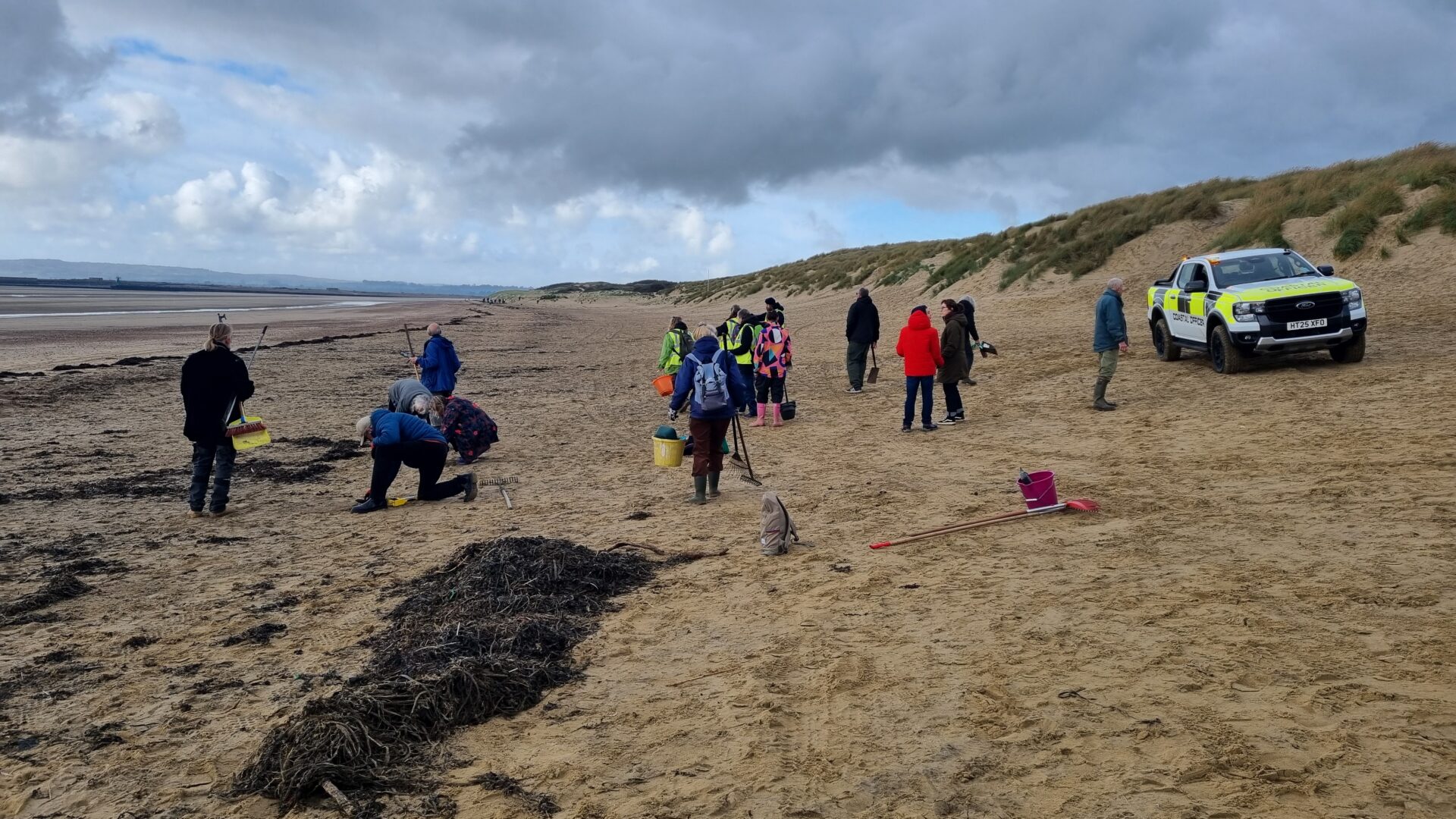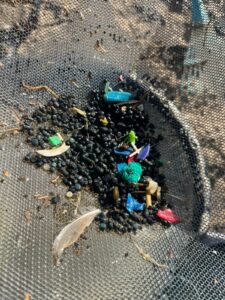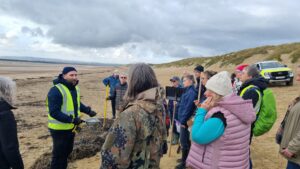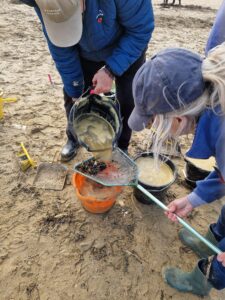
Environmental catastrophe as two broken systems collide
Toxic bio-beads wash up on Camber Sands.
Toxic bio-beads wash up on Camber Sands
As the seasons shift and the shore’s alive with late-Autumn swells, our beaches and seas should remain places of freedom, nature, and joy. Yet, instead we face an alarming new crisis: millions of tiny plastic pellets, known as bio-beads, have washed up on Camber Sands in East Sussex. Creating what looks like the worst plastic-pellet pollution incident on the UK coast for years.
And the culprit responsible for this ecological disaster? None other than the broken water industry. Southern Water to be precise.
The environmental catastrophe at Camber Sands is a heartbreaking result of two broken systems colliding: a failing water industry and the systemic over-reliance on plastic.

What’s actually happened?
Between the 7-10th November 2025, communities in East Sussex found a continuous thick black line made up from millions of black plastic pellets, washed up on the shore. They were confirmed to be bio-beads (small plastic pellets used in wastewater treatment) originating from one of Southern Water’s facilities.
Southern Water finally admitted that these plastic beads were released two weeks prior from their Eastbourne treatment plant, due to a screening filter failure during Storm Benjamin. The incident is now under investigation by the Environment Agency and Rother District Council.
Local volunteers, Rother Coastal Officers and two expert charities – Strandliners and Nurdle, are working tirelessly on the beach to remove as many beads as possible, but it is a race against time and tide.
Southern Water have tried to claim some fame, suggesting they’re heroically helping with the clean-up efforts. And whilst we absolutely welcome all and any Southern Water staff helping on beach clean-ups, we also urge the company to act on genuine environmental concern and willingness to take responsibility at all levels. And to not use this as an opportunity to glass over their major systemic failures and ongoing community neglect.
We don’t need public apologies and vows that Southern Water ‘will improve its understanding of the water treatment process’ – surely we’re not the only ones concerned with this last statement?! – we need commitment to footing the bill of the clean-up and vows to protect the planet.
Camber Sands is not only a beloved beach destination for locals and visitors, it’s also a designated Site of Nature Conservation Importance (SNCI) and Site of Special Scientific Interest (SSSI). Home to numerous protected species, with its sand dunes notably providing habitat for various birds, mammals and insects. It’s a vital area for conservation efforts. Despite mega clean-up operations, there’s great concern that severe damage has already been done. And we fear what further impacts will continue in the coming weeks.
Local MP Helena Dollimore, in an email to locals said:
“It beggars belief that Southern Water failed to detect the loss of millions of these plastic beads for an entire fortnight, leaving them free to wash up on our East Sussex coastline and cause an environmental catastrophe. It should not have taken our community to uncover the truth, and our local volunteers to clean up their mess.”

What are Bio-Beads, and why are they so harmful?
Bio-beads are a type of micro plastic pellet which, when they end up in the environment, are incredibly difficult to remove, causing long-term implications for marine life, beach users and coastal ecosystems.
Small in size, these toxic plastic pellets get into the food chain. They are easily mistaken for food and are often ingested by birds, marine animals and fish, resulting in sometimes fatal harm. Once ingested, the pellets cannot be expelled and may cause starvation, internal injury or poisoning.
To make matters worse, the rough surface of Bio-Beads encourages bacteria to survive. And due to the nature of their use – to filter our chemical-laden raw sewage – we can only imagine how many highly toxic chemicals, pathogens and viruses are carried on these plastics.
Dr Emily Stevenson, a marine microbiologist at the University of Exeter and Plymouth Marine Laboratory explained:
“Bio-beads and other plastic bio-media are intentionally added to wastewater in treatment plants around the country. The idea is to provide a cost-effective and durable surface where bacteria can grow, which naturally degrade nutrients and contaminants from wastewater. However, we have seen several cases where bio-media can spill into the surrounding environment, and the concern is that they will carry with them the bacteria and chemicals that became attached when incubated in sewage.
In our research, we have found that both disease causing and drug resistant microbes are present on bio-beads in the environment, which present a real concern to all human and wildlife that may come into contact with them”
Southern Water – clean up your act!
While it’s good Southern Water have held their hands up and apologised for this incident, we know all too well that it isn’t nearly enough.
This disaster was a direct consequence of the company’s many failings, not least a chronic underinvestment in infrastructure. Southern Water has prioritised profits at the expense of protecting the environment and local communities. In the latest Environmental Performance Assessment (EPA) ratings from the Environment Agency, the company scored just two stars out of four, meaning ‘requiring improvement’. With the company instructed to ‘get a grip on pollution incidents’.
Against the backdrop of ongoing financial difficulties and a ban on the company paying bonuses following a serious pollution incident in the New Forest in August 2024, CEO Lawrence Gosden’s pay package has nearly doubled to £1.4m in just the last financial year. Despite this, the initial costs of the clean-up have fallen to local public bodies, with Rother District Council having to employ additional contractors to clean up the plastic pellets. This is yet another terrible example of the public having to foot the bill for failures of the private water industry. It is these kinds of public costs that government ministers fail to account for when they insist on keeping the industry in private hands.
Weeks on from the incident, many questions remain. How was such a catastrophic failure at a water treatment facility so able to fly under radar for days before the impacts became clear? Considering that the treatment facility where the bio-beads are suspected to have leaked from is some 35 miles away from where they then washed ashore, how will the impact be monitored and dealt with across the south coast? Given these bio beads are not only plastic pollution but are also used in sewage treatment, what will be the impact on local eco-systems? And will Southern Water take full responsibility, and pick up the cost?

Not just a one off incident – not just Camber Sands.
This is not a trivial spill or one-off glitch. It is a major environmental event caused by the systemic failures of the water industry. And it’s just one of many events happening across the UK:
- Just last month, dozens of surf breaks and beaches in Wales, from Langland to Rhosilli were also plagued by thousands of plastic Biodiscs. Once again poured into the sea from Wastewater Treatment Works.
- In 2024, Biodiscs were found appearing on north-east beaches across Scotland, 14 months after a sewage plant spill.
- And Campaigners in Falmouth, Cornwall, are still suffering the consequences of a spill of highly toxic Bio-Beads from South West Water some 15 years on!
These are just a handful of examples that highlight the persistent and widespread issue that sits at the convergence of two major threats we campaign on: plastic pollution and sewage system failures. It shows that even the ‘hidden’ plastic streams, like wastewater treatment, can have dramatic impacts when they fail.
As SAS, we are calling for urgent action:
- Southern Water must foot the bill for the clean-up operation and ongoing monitoring of the impact of this leak.
- An independent investigation needs to be conducted, with findings and solutions clearly communicated to the public, to make sure this and other leaks don’t happen again.

What you can do
- If you spot Bio-beads or Biodiscs on any beach, report it to the Environment Agency, SEPA or NIEA.
- Reach out to your local Reps or Plastic Free Community to see how you can help the clean-up at Camber, or on your nearest beach.
- Join the People Vs Plastic and #EndSewageCampaign to demand change and put an end to the profiteering polluters’ ways for good.
We will not rest until the ocean is protected, polluters are held responsible, and we move beyond reliance on plastic systems. Our vision remains: thriving ocean, thriving people.
